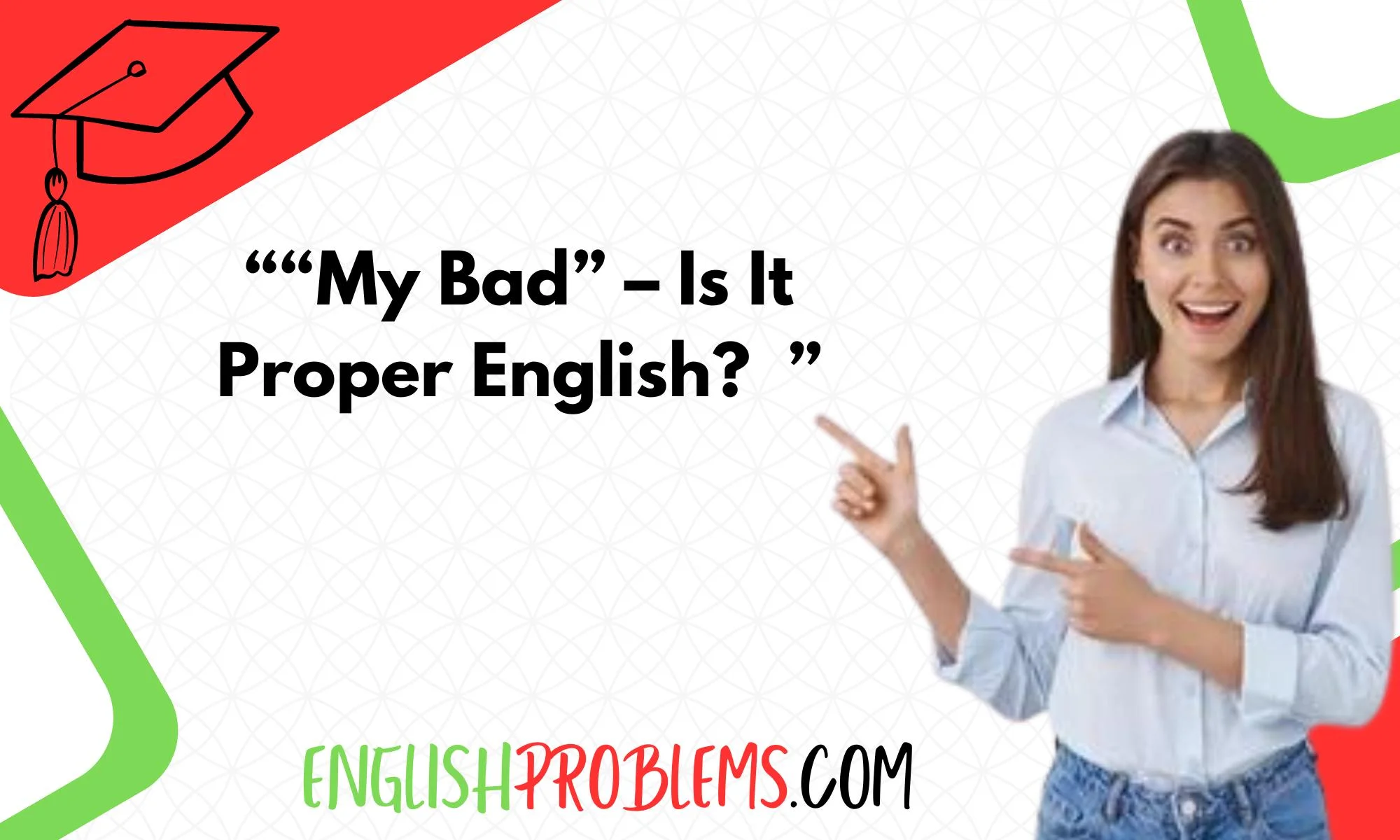When was the last time you heard someone say “my bad“? Maybe it was a friend who spilled coffee on your desk or a colleague who missed an important meeting.
This phrase has become a staple in everyday language, but is it proper English? Let’s dive deep into the origins, usage, and alternatives to this casual apology.
The Origin and Meaning of “My Bad”
Historical Background: “My bad” is a relatively recent addition to the English language. While its exact origin is debated, many believe it emerged from the world of sports, particularly basketball. Some trace it back to the early 1980s when players used it to acknowledge a mistake quickly.
Etymology: The phrase breaks down simply: “my” denotes ownership, and “bad” refers to a mistake or error. Together, they form a succinct and informal way of admitting fault.
Understanding Colloquial Phrases
Definition of Colloquialism: Colloquial phrases are informal words or expressions used in casual conversation rather than formal speech or writing. They are often region-specific and can vary widely in usage and meaning.
Examples of Common Colloquialisms:
- “Gonna” (going to)
- “Wanna” (want to)
- “Y’all” (you all)
- “Bail” (leave abruptly)
These phrases add color to language but can be inappropriate in formal settings.
The Journey of “My Bad” into Everyday Language
Popularization: “My bad” gained mainstream popularity through sports and media. Movies, TV shows, and music in the late 20th century helped cement its place in everyday vernacular. For example, the 1995 movie “Clueless” featured characters using the phrase, further popularizing it among teens and young adults.
Cultural Integration: Over time, “my bad” crossed demographic and regional boundaries, becoming a widely recognized and used phrase across different age groups and cultures.
Is “My Bad” Acceptable in Formal Situations?
Formal vs. Informal Language: Formal language is used in professional and academic settings, characterized by complete sentences, precise vocabulary, and a lack of slang. Informal language, on the other hand, includes colloquialisms, contractions, and casual expressions.
Appropriateness in Professional Settings: While “my bad” is acceptable in casual conversations, it may not be suitable in formal or professional contexts. Using “my bad” in a business meeting or professional email can come off as unprofessional and insincere. Instead, opt for more formal apologies, such as “I apologize for the mistake” or “I regret the error.”
Language Purists vs. Modern Usage
Purist Perspective: Language purists argue against the use of phrases like “my bad,” believing they undermine the integrity of formal English. They advocate for clear, proper language that maintains traditional standards.
Modern Linguistic Trends: However, language is constantly evolving. Modern usage embraces informal phrases, reflecting how people communicate in everyday life. Linguists recognize that language changes and adapts to cultural shifts, and phrases like “my bad” are part of that evolution.
Context Matters: When to Use Informal Phrases
Situational Usage: Informal phrases are best used in relaxed, familiar settings. For instance, with friends or family, saying “my bad” is perfectly acceptable. In professional or unfamiliar situations, it’s better to use more formal language.
Code-Switching: Adapting language to suit different social contexts is known as code-switching. It involves switching between different language styles depending on the audience, ensuring effective and appropriate communication.
Why Apologies Matter in Communication
Role of Apologies: Apologies play a crucial role in communication by acknowledging mistakes and expressing regret. They help maintain relationships, build trust, and facilitate resolution.
Psychological Impact: An effective apology can alleviate tension, demonstrate accountability, and show empathy. It can make the difference between repairing a relationship and causing further damage.
“My Bad” and Its Impact on Personal Relationships
Casual Apologies: In personal relationships, casual apologies like “my bad” can convey a sense of humility and willingness to admit faults without making a big deal out of it. However, overusing casual apologies might lead to perceptions of insincerity.
Perception of Sincerity: The sincerity of an apology depends on the context and delivery. In close relationships, a heartfelt “my bad” can be enough, but in more significant matters, a more elaborate apology might be necessary.
Building or Eroding Trust with Words
Trust in Communication: Trust is fundamental in any relationship, and the words we use significantly impact how that trust is built or eroded. Sincere, thoughtful language fosters trust, while careless words can damage it.
Impact of Casual Apologies: Using casual phrases like “my bad” in serious situations might undermine trust. It’s essential to gauge the context and choose words that convey genuine remorse and responsibility.
How Apologies are Perceived in Different Cultures
Cultural Variations: Apology styles can vary significantly across cultures. In some cultures, elaborate and formal apologies are expected, while in others, a simple acknowledgment suffices.
Global Perspective: Understanding these cultural nuances is crucial, especially in international settings. For example, in Japan, apologies are deeply rooted in social norms and often involve a humble demeanor. In contrast, Western cultures might accept more straightforward apologies.
Alternatives to Saying “My Bad” in Professional Settings
Formal Alternatives: When in professional settings, consider these formal alternatives to “my bad”:
- “I apologize for the oversight.”
- “I regret the error.”
- “Please accept my apologies.”
- “I take full responsibility for the mistake.”
Context-Specific Suggestions: Here are some context-specific phrases for different professional scenarios:
- Email Communication: “I apologize for the confusion caused by my previous email.”
- Meetings: “I regret the misunderstanding and will ensure it doesn’t happen again.”
- Customer Service: “We apologize for any inconvenience caused and appreciate your understanding.”
Conclusion
Summary of Key Points: Understanding the origins and proper usage of “my bad” helps navigate its appropriateness in different contexts. While it has a place in casual conversation, more formal alternatives are necessary in professional and serious situations.
Final Thoughts: Language is a dynamic and evolving tool. Being mindful of context and audience ensures effective communication and helps maintain trust and respect in relationships.

Mia Evans brings a love for language and a knack for clarity to EnglishProblems.com. Her engaging writing style and expert knowledge help readers navigate the tricky terrain of English grammar with confidence and ease.










